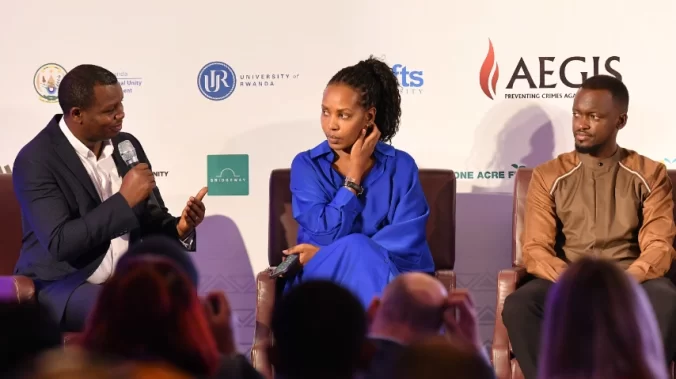SongWriter Season 6 Continues with Freddy Mutanguha, Hope Azeda & Peace Jolis
Photo by Aegis Trust
SongWriter is a podcast that turns stories into songs, featuring David Gilmour (Pink Floyd), Joyce Carol Oates, Steve Earle, David Sedaris, Susan Orlean, Craig Finn (The Hold Steady), and Questlove.
In the newest episode of SongWriter, Freddy Mutanguha describes surviving the Rwandan genocide. Thirty years later, Freddy is the CEO of the Aegis Trust, the organization that built the Kigali Genocide Memorial. Because of his work and his life story, Freddy is deeply engaged with the complicated issue of forgiveness. In the episode he describes how he eventually decided to forgive the man who murdered his mother.
“The people who came to attack our house, they were people we knew,” Freddy says. “They were our neighbors. The person who took out from our house my mom, actually was her student.”
Freddy’s mother had been a teacher, and taught math to the boy who would grow up to be what Rwandans refer to as a perpetrator. When Freddy went to the prison, the man refused to speak with him, and would not accept the forgiveness that was offered. Still, as Freddy points out, forgiveness is not just for the perpetrators, but also for victims.
“You have these conflicting feelings,” Freddy says. “These people have done a bad thing to you, these people, you should hate them. But at the same time I have to say, ‘No. I have five children. If I do what I want to do…to hate those people because they hated me, then what am I doing for my children?’”
“This is certainly the most difficult part,” Freddy reflects. “What do we tell our children?”
Scientist and forgiveness researcher Dr. Pamela Wadende took part in a live SongWriter performance in Kigali with Freddy. Dr. Wadende works with communities in rural Kenya, Cameroon, Zambia, and Ethiopia, researching local forgiveness rituals and practices. Effective community justice practices, Dr. Wadende explains, help people engage with forgiveness and healing, and crucially, help to reintegrate perpetrators into the community. These local practices—distinct and apart from state-level justice, as in a prison sentence—are a key part of ending cycles of revenge and violence.
-

-

-

-

-

-

-

-

-

-

-

-

-

-

-

-

-

-

-

-

-

-

-

-

-

-

-

-

-

-

-

-

-

-

-

-

-

-

-

-








































